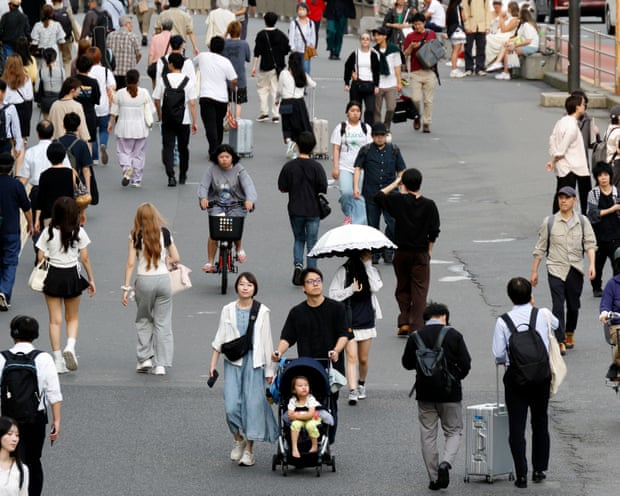Japan records lowest number of births in more than a century, as population fears grow
New government data shows the number of births reached 686,061 in 2024, a decline of 5.7% from the previous year and the lowest since statistics were first kept in 1899

Japan’s struggle to encourage couples to have more children has been given greater urgency after data showed the annual number of births dropped to below 700,000 for the first time since records began more than a century ago.
According to government data released this week, the number of births reached 686,061 in 2024, a decline of 5.7% from the previous year and the lowest since statistics were first kept in 1899. The data excludes babies born to foreign residents.
The fertility rate – the average number of children a woman has in her lifetime – also fell to a record-low of 1.15, down from 1.20 in 2023, the health ministry said. That is well below the rate of 2.1 needed to keep the population stable. The ministry said 1.6m deaths had been recorded in 2024, up 1.9% from a year earlier.
The number of births and the fertility rate have fallen for nine years in a row, although the number of marriages was slightly up last year, two years after it dipped below half a million for the first time.
The number of marriages – a key factor in influencing birth trends in a country where relatively few children are born out of wedlock – rose for the first time in two years to 485,063, up by 10,322 from a year earlier. But the downward trend seen since the 1970s remains unchanged.
Japan’s birthrate has been falling since it reached the second baby boom in 1973, falling below 1 million in 2016 and below 800,000 in 2022. Last year’s figure is about one-quarter of the all-time peak of 2.7 million births in 1949.
The latest figures will make uncomfortable reading for officials, as the number of births has fallen into the 680,000 range 15 years earlier than forecast by the National Institute of Population and Social Security Research, according to the Kyodo news agency.
If current trends persists, Japan’s population of about 124 million is projected to fall to 87 million by 2070, when 40% of the population will be 65 or over.
A shrinking and ageing population could have serious implications for the economy and national security, as the country seeks to boost its military to counter potential threats from China and North Korea.
The prime minister, Shigeru Ishiba, who has described Japan’s demographics as a “silent emergency”, recently unveiled measures to boost the birthrate, including an expansion of child allowance and free high school education, and a guarantee that couples will receive the equivalent of 100% of their take-home pay when they take parental leave at the same time.
Ishiba’s predecessor, Fumio Kishida, warned that the falling birthrate, combined with rising numbers of deaths, threatened Japan’s ability “to function as a society”, adding the country had reached a “now or never” moment to address its demographic crisis.
But attempts by successive governments to ease the financial pressure on couples have had little effect, with statistics showing that people continue to marry later in life, a trend that results in smaller families.
The government has been criticised for focusing on married couples rather than on younger, single people who have been put off the idea of marriage. Many cite poor employment prospects and job security, the rising cost of living, and a corporate culture that makes it difficult for female employees to become working mothers.
A 2023 survey by the Nippon Foundation found that only 16.5% of people aged 17 to 19 believed they would get married, even though a much larger proportion wanted to do so.
[Source: The Guardian]























/file/attachments/orphans/IMG_9103_429753.jpeg)




























